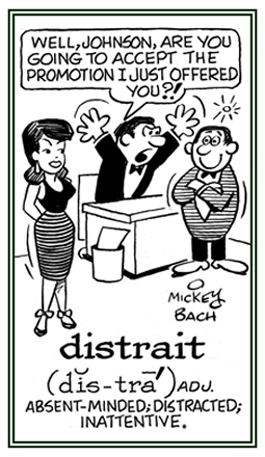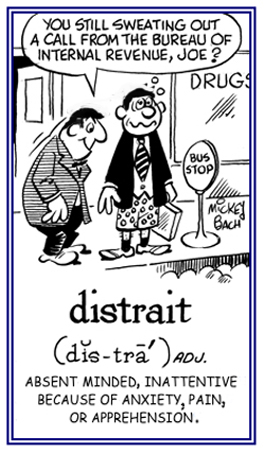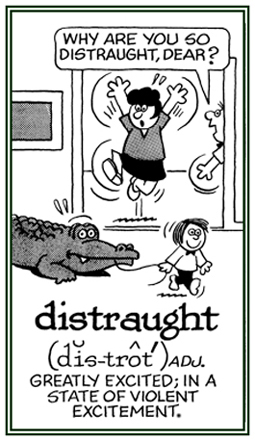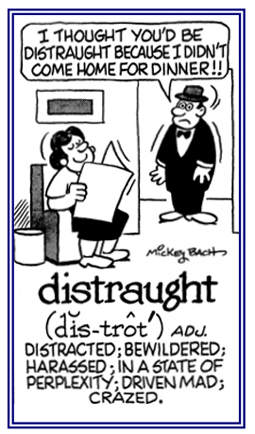dis-, di-, dif-
(Latin: separation, apart, asunder; removal, away, from; negation, deprivation, undoing, reversal, utterly, completely; in different directions)
The meaning of dis- varies with different words; dif-, assimilated form of dis- before f; di-, form of dis- before b, d, g, l, m, n, r, and v.
Someone who, or that which, twists out of shape or makes crooked or deformed.
1. The describing, or reporting, of something in a way that is inaccurate or misleading.
2. The bending, twisting, stretching, or forcing of something out of its usual or natural shape.
3. A part of something that has been bent, twisted, stretched, or forced out of its usual or natural shape.
4. The altering of something; such as, a radio or television signal to the extent that it becomes unclear or unrecognizable.
5. An alteration in an image in which the original proportions are changed, resulting from a defect in a lens or an optical system.
2. The bending, twisting, stretching, or forcing of something out of its usual or natural shape.
3. A part of something that has been bent, twisted, stretched, or forced out of its usual or natural shape.
4. The altering of something; such as, a radio or television signal to the extent that it becomes unclear or unrecognizable.
5. An alteration in an image in which the original proportions are changed, resulting from a defect in a lens or an optical system.
distract
distractedly
distractedness
distraction
distractive
distractively
distrain
1. To seize someone's movable property either in lieu of payment of a debt or in order to force the person to pay.
2. To seize and hold (property) to compel payment or reparation, as of debts.
2. To seize and hold (property) to compel payment or reparation, as of debts.
distrainable (adjective), more distrainable, most distrainable
Disposed to forcing or compelling someone to satisfy an obligation by means of distress: The distrainable chattels of his household were appropriated by the landlord and kept until Jack's unpaid debts on his rent had been paid.
distraint
The act of distraining; a distress.
distrait (adjective), more distrait, most distrait
1. A reference to something which or someone who interferes with another person's full attention to something: The death of her father caused Jane to be so distrait, that she couldn’t concentrate on her work as a secretary.
2. Relating to someone who has his or her attention diverted; especially, because of anxiety about something: Mrs. Smith, Jack’s teacher, had to ask him the same question twice because he was such a distrait student at the time and he wasn’t able to pay attention to what she was talking about.

© ALL rights are reserved.

© ALL rights are reserved.
Go to this Word A Day Revisited Index
2. Relating to someone who has his or her attention diverted; especially, because of anxiety about something: Mrs. Smith, Jack’s teacher, had to ask him the same question twice because he was such a distrait student at the time and he wasn’t able to pay attention to what she was talking about.


Go to this Word A Day Revisited Index
so you can see more of Mickey Bach's cartoons.
distraught (adjective), more distraught, most distraught
1. Conveying a deeply agitated or distracted condition; especially, with emotional conflicts: Lulu was a distraught child because she often witnessed her parents having violent arguments.
2. Descriptive of being mentally deranged; crazed, or insane: The distraught passenger on the subway was talking loudly to herself and waving a book at the other people sitting near her.

© ALL rights are reserved.

© ALL rights are reserved.
Go to this Word A Day Revisited Index
2. Descriptive of being mentally deranged; crazed, or insane: The distraught passenger on the subway was talking loudly to herself and waving a book at the other people sitting near her.


Go to this Word A Day Revisited Index
so you can see more of Mickey Bach's cartoons.
1. A mental suffering; such as, that caused by grief, anxiety, or unhappiness.
2. Hardship or problems caused by a lack of basic necessities.
3. Physical pain or discomfort.
4. Great danger or difficulty, with a need for immediate assistance.
5. Etymology: from Latin districtus, past participle of distringere, "to draw apart, to hinder"; also, in Medieval Latin (Latin as written and spoken c.700-c.1500), "to compel, to coerce"; from dis-, "apart" + stringere, "to draw tight, to press together".
2. Hardship or problems caused by a lack of basic necessities.
3. Physical pain or discomfort.
4. Great danger or difficulty, with a need for immediate assistance.
5. Etymology: from Latin districtus, past participle of distringere, "to draw apart, to hinder"; also, in Medieval Latin (Latin as written and spoken c.700-c.1500), "to compel, to coerce"; from dis-, "apart" + stringere, "to draw tight, to press together".
distressful (adjective), more distressful, most distressful
1. Causing distress, or experiencing worry or anxiety.
2. Causing or involving distress: "There are extensive distressful circumstances of poverty and sickness in this family."
3. Pertaining to a feeling, of severe pain: "The little boy fell down and hurt his knee and his mother heard his distressful cry and ran to help him."
2. Causing or involving distress: "There are extensive distressful circumstances of poverty and sickness in this family."
3. Pertaining to a feeling, of severe pain: "The little boy fell down and hurt his knee and his mother heard his distressful cry and ran to help him."


